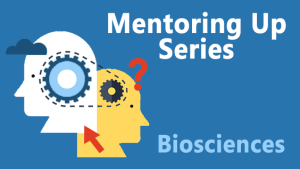
Mentoring Up Training for Postdoctoral Scholars and Graduate Students
Please note that the Mentoring Up workshops have been put on indefinite pause due to a decision to reframe the series. These upcoming changes will be announced within the coming months.
Overview
Mentoring is collaborative. Ideally, mentees and mentors engage as partners through reciprocal activities such as planning, acting, reflecting, questioning, and problem-solving. Successful mentoring relationships are those in which mentees reach the individual milestones that allow them to progress to the next stage along the trajectory for a sustainable career.
Mentee success is defined as mentees having gained…
- Personal and professional competencies necessary to define their research goals.
- Experience for that career.
- The ability and opportunity to progress toward that chosen career goal.
The content of each session in this curriculum is designed to address some of the challenges and concerns that mentees might encounter throughout their career. In this mentoring up series, mentees will develop the knowledge and skills to proactively and effectively address these challenges and navigate their mentoring relationships and career progression.
Notice: Each event requires a minimum number of participants. If the minimum isn’t reached the event might be cancelled or postponed.
These workshops are sponsored and hosted by UCLA Bioscience Graduate Programs & Postdoctoral Affairs.
Questions?
Postdocs should email Dr. Lynn Talton (LTalton@mednet.ucla.edu).
Grad students should email Dr. Diana Azurdia (DAzurdia@mednet.ucla.edu).
